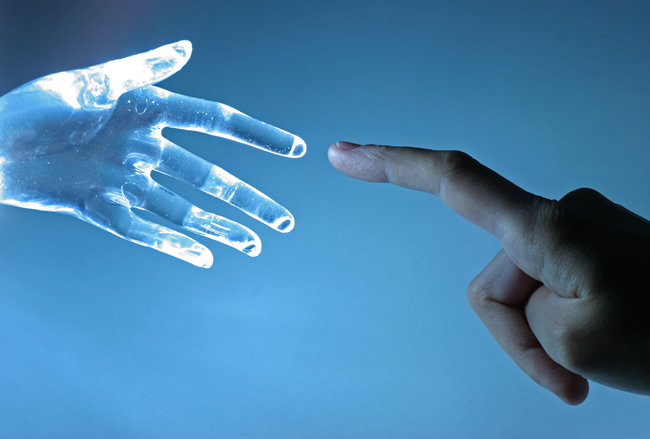 [schema type=”person” name=”John Giannandrea” orgname=”Google” jobtitle=”Head Of Search” url=”https://www.google.com/” description=”John Giannandrea is the Head of Search for Google.” street=”1600 Amphitheatre Pkwy” city=”Mountain View” state=”CA” postalcode=”94043″ country=”US” phone=”650-253-0000″ ]
[schema type=”person” name=”John Giannandrea” orgname=”Google” jobtitle=”Head Of Search” url=”https://www.google.com/” description=”John Giannandrea is the Head of Search for Google.” street=”1600 Amphitheatre Pkwy” city=”Mountain View” state=”CA” postalcode=”94043″ country=”US” phone=”650-253-0000″ ]For those of you who haven’t heard, Google’s head of search Amit Singhal has announced that he is leaving Google after 15 years. While this is big news in itself the bigger discussion is around who he is being replaced by … a robot. OK – perhaps that’s a bit of a leap but he is being replaced by John Giannandrea who leads the AI team at Google and spearheaded RankBrain.
Why This Is Important
I probably don’t have to tell most of our readers why this is important but for those who are just getting your feet wet in SEO, it marks a dramatic shift in the way information will be classified and further, how it will be presented. While Amit approved the rollout of RankBrain into the algorithm he was known to have large concerns about machine learning in search due to the reduced control and even ability to understand why things rank where they do. More on that below.
This move is massively important as it signals a major torch passing at Google from human-controlled search to AI controlled. From engineers building algorithms to engineers building AI that builds the algorithms. A subtle shift semantically but a major shift in what the future of search holds. To understand why that is let’s discuss …
The Oddity Of Neural Nets
A neural net (or neural network) is a hardware and software system build to approximate the functioning of the human brain. Like the human brain they can learn and can analyze large amounts of date quickly and efficiently. But they create an oddity …
On Quora, ex-Googler Edmond Lau wrote:
“In a machine learning system, it’s hard to explain and ascertain why a particular search result ranks more highly than another result for a given query. The explainability of a certain decision can be fairly elusive; most machine learning algorithms tend to be black boxes that at best expose weights and models that can only paint a coarse picture of why a certain decision was made.”
So like the human brain, machine learning systems can “make decisions” that are not easily understood by those outside the system. Where the algorithm historically has been based on human designed formula with factors being tweaked and weighted by engineers, with machine learning we will no longer understand the specific weights, how and when they might be applied or changed and likely when new factors are introduced that were not added by a human. Essentially we will lose the ability to control the results ourselves.
Chris Nicholson of Skymind said of the issue: “People understand the linear algebra behind deep learning. But the models it produces are less human-readable. They’re machine-readable. They can retrieve very accurate results, but we can’t always explain, on an individual basis, what led them to those accurate results.”
As Wired puts it: “What this means is that, in order to tweak the behavior of these neural nets, you must adjust the math through intuition, trial, and error. You must retrain them on new data, with still more trial and error. That’s doable, but complicated. And as Google moves search to this AI model, it’s unclear how the move will affect its ability to defend its search results against claims of unfairness or change the results in the face of complaints.”
To me this is both a clear illustration of the issue Google will face coupled with an error in understanding about one of the obvious ways to solve it on the part of the Wired author. To be clear, I am not a computer scientist nor am I an AI specialist however it seems to be that the obvious solution to the issue of having to train the AI through trial and error is to program it to train itself. That is, rather than an engineer looking at various factors and entering them into the AI, allow the AI to recognize these factors for itself and not only adjust weighting but introduce new factors it may isolate as relevant.
The Future Of Search
We are at the earliest stages of this process however the RankBrain “experiment” which impacted 15% of all queries provides better results 10% more often than results programmed by human engineers so it is clear that this is a legitimate path to follow and further, that the AI can often determine what humans want better than humans.
What I see coming on the horizon is a world that is virtually impossible to game in that the rules will be ever changing and user-specific. The ranking of one document over another will, as illustrated above, be difficult to determine even for folks on the inside let alone for SEO’s pushing us further down the path of focusing on conversions and quality. As AI takes over the rules will change and likely not even be known. The debate over time-on-site being a factor will be out the window as will CTRs and the other nit-picky aspects of the formula we love to dwell on. It will all matter and we won’t have any idea what pieces do and do not and “worse” – aspects may play a part for query or user X and not for Y. On the other hand, AI is more likely to be able to programmatically understand a site structure and usability. The idea of cramming verbiage around a picture just to avoid thin content issues will disappear as the image itself is understood for the full thousand words that it is.
It is a brave new world and while there are going to be speed bumps and hiccups along the way to be sure, I’m personally confident that as we look back on this moment from 2021 we will be in awe at what website promotions is to become and what the liberation from being tied to engineer-crafted algorithms can yield for website owners and users.
The Final Word
While I’m sure Mr. Giannandrea has a lot on his plate right now and isn’t likely reading this post I would like to congratulate him on his new position. I’ll be watching his actions with great interest.
For those of you who are interested in AI and how it’s going to impact SEO I cannot recommend enough reading a brilliant article by Eric Enge over on the Moz blog titled, “The Machine Learning Revolution: How it Works and its Impact on SEO“. It eloquently described how machine learning works and how it will impact SEO in the future. Listing it as mandatory reading would be an understatement for those not up on AI at Google.
